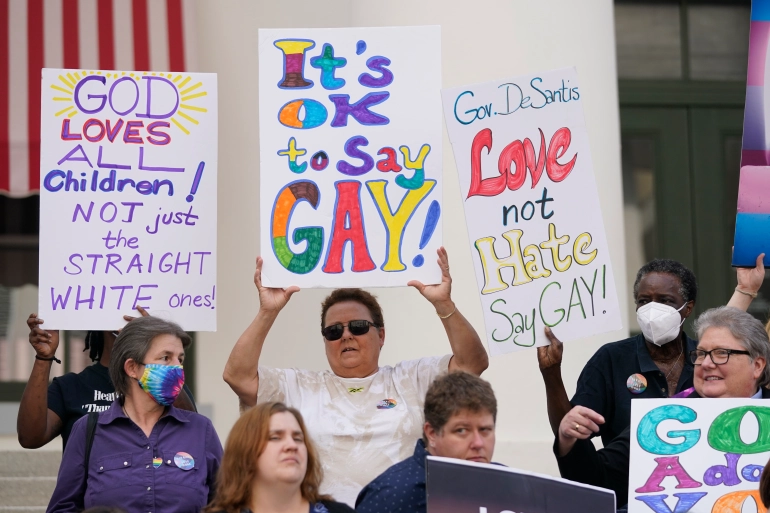Florida passing “Don’t Say Gay” bill will do more harm than good
March 25, 2022
Florida governor Ron DeSantis has recently voiced his support for the state’s “Parental Rights in Education,” or as critics call it, the “Don’t Say Gay” bill. The bill asserts school districts “may not encourage discussion about sexual orientation or gender identity in primary grade levels or in a manner that is not age-appropriate or developmentally appropriate for students.” It additionally states the school must inform parents of their children’s sexual orientation or gender identity within six weeks of learning so. It has passed through the Florida House, and is currently awaiting a vote in the Senate.
The bill primarily does discuss parental access to student documents and information, as its name suggests.
It primarily discusses the ability for parents to have access to critical information about their children, but also states the act will prohibit “classroom discussion about sexual orientation or gender identity in certain grade levels or in a specified manner.” It also states that “classroom instruction by school personnel or third parties on sexual orientation or gender identity may not occur in kindergarten through grade 3 or in a manner that is not age appropriate or developmentally appropriate for students in accordance with state standards”
However, Rep. Michael Grieco spoke out against this portion of the bill.
“Anybody who says that this bill is only about kindergarten through third grade is either mistaken or flat-out lying,” Grieco said to other representatives.
Many fear that this bill may lead to more extreme acts, potentially banning classroom discussion of sexuality and gender identity in older grades as well.
LGBTQ+ students who learned about LGBTQ+ figures or history in classes were 23% less likely to attempt suicide according to research by the Trevor Project, an organization focus on helping Queer youth.
The bill not only harms already marginalized students, but it also erases history. Marsha P. Johnson, a gay drag queen and activist, was a prominent figures in the Stonewall uprising. The Stonewall Riots were a series of demonstrations by the LGBTQ+ community following the police raids on gay bars in New York City. They were a large part of gay liberation efforts. Her identity, and the history the comes along with the protests, could be erased with the “Don’t Say Gay” bill.
Additionally, this legislation further reinforces the idea that impressionable kids should be ashamed of their identity by acting as if LGBTQ+ identities are “taboo.”
Rep. Carlos Guillermo Smith, a gay Democrat, claims the bill treats LGBT+ topics as inappropriate for children/students.
“What topics specifically about people like myself, LGBTQ+ Floridians, are not appropriate to teach in the classroom?” Smith said in his speech to the Florida House of Representatives. “Is it topics about how LGBTQ+ people love one another? Is it topics about our marriages, which are legal in the United States and Florida, is it conversations about our families, or is it conversations about sexual activity? This bill goes way beyond the text on its page. It sends a terrible message to our youth that there is something so wrong, so inappropriate, so dangerous about this topic that we have to censor it from classroom instruction.”
Even President Joe Biden has spoken out against the bill.
“I want every member of the LGBTQI+ community — especially the kids who will be impacted by this hateful bill — to know that you are loved and accepted just as you are,” Biden tweeted. “I have your back, and my Administration will continue to fight for the protections and safety you deserve”
This legislation is not unique to Florida. Texas, Oklahoma, Louisiana, and Mississippi also have similar bills.
California, Colorado, Connecticut, Illinois, Nevada, New Jersey and Oregon have bills that counteract the “Don’t Say Gay” bill; they require the curriculum is inclusive of LGBTQ+ students.
“Teaching respect highlights how inclusive curriculum can positively affect students’ experiences in school,” Gay, Lesbian & Straight Education Network Executive Director, Dr. Eliza Byard said. “We want every student in school to realize their full potential. By including LGBT people, history and events in school curriculum, educators ensure that all students feel welcome, safe and valued.”



